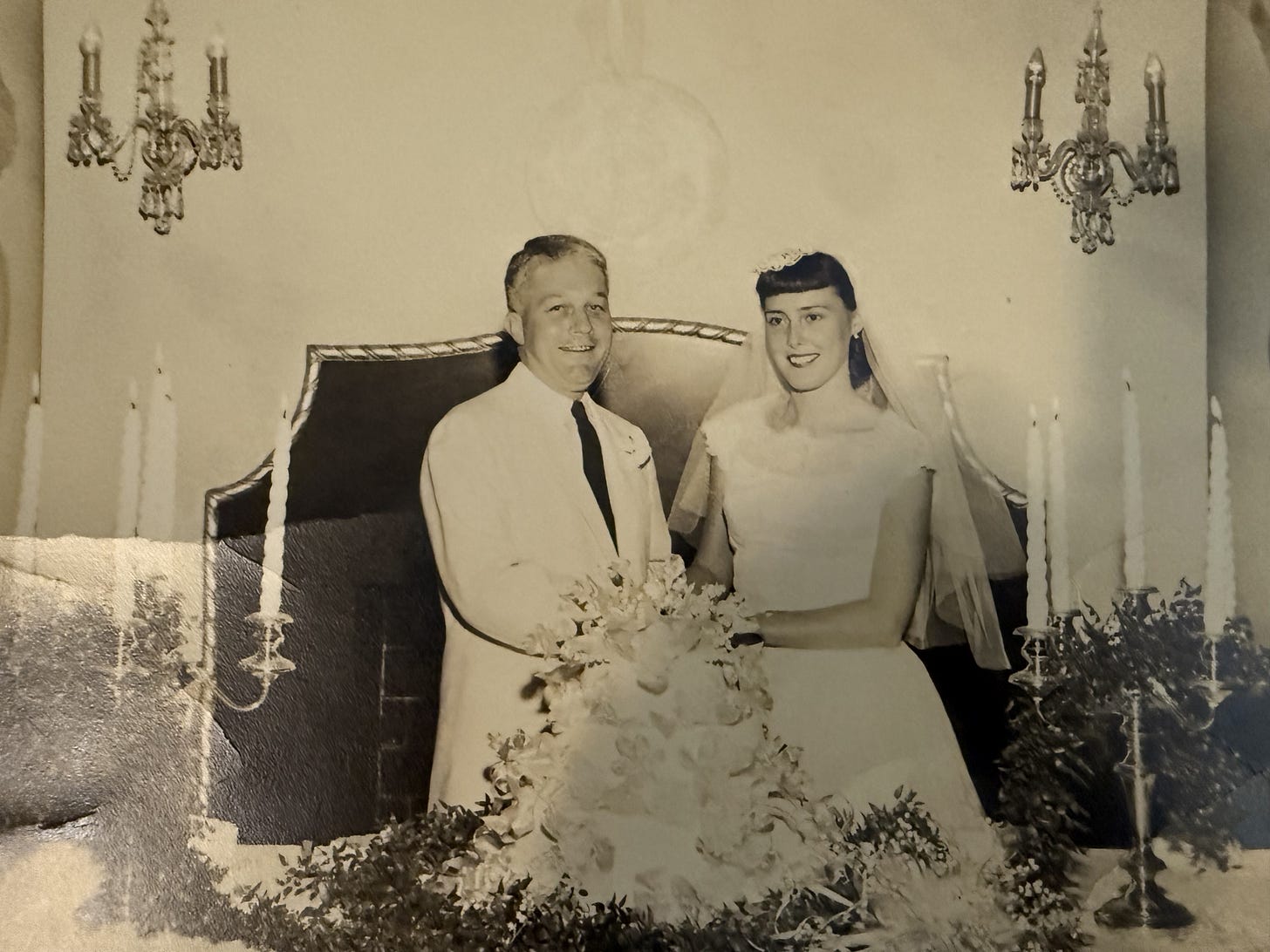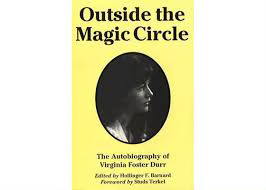This will sound bad on paper when I tell you my husband, Hugo, calls me a “bad wife.” Why? Because he calls himself my “valet,” and it’s true, his love language is service. Which means he cooks a lot and will retrieve my earbuds in the car late at night when I’m too lazy to get out of bed. He brings me coffee every morning.
But according to scripture, I’m supposed to be waiting on him.
I love sourdough bread and the idea of an idyllic life on the farm, but I state the obvious when I say I’m not a trad wife despite the fact I wore a few Laura Ashley dresses back in the day. A trad wife isn’t a stay-at-home mom because that implies choice. Trad wife influencers and their adherents follow “traditional” gender roles as submissive wives tending hearth and home, producing babies, and being unthreatening in a milkmaid fantasy sort of way. In this worldview, Project 2025 aims for all women to obey the Biblical mandate of a traditional feminine role of wife and mother to the exclusion of all else, without equal rights, financial independence, no-fault divorce, reproductive rights, and every other small gain we have made since I was born in 1965.
I grew up the daughter of a traditional wife who did what women of her generation were told to do. When I asked my mother why she had four children, she said, “That’s just what you did back then.” She also said her doctor told her the placenta acted as a barrier between alcohol and cigarettes, but that’s another story.
At that time, as civil rights activist Virginia Foster Durr wrote, there were three paths a privileged southern woman could follow. She could live the unexamined life of a southern belle, lose her mind, and go crazy, or honor her rebellious spirit, “step outside the magic circle,” and blaze a new path into a world she would have never known.
Traditional Wife
My mother did what privileged women of her generation did, going from private schools to the country club to European trips to marriage eventually. As a young girl, she had been an exceptional student and athlete, praised for her papers on the English Romantic poets, known as a fierce swimmer and talented golfer. As a young woman, she married late for her generation. After college, her passion for books led her to a job at the Birmingham Public Library, a job like teaching that was a proper place for a young, educated woman. A fixture in Birmingham’s social scene in the 1950s, she turned down marriage proposals, one after another.
After two decades of marriage and four children later, my mother woke up one day to what had been staring her in the face for years. The money, her security, her safety net was gone. All gone. Her parents and husband, who’d defined her role as daughter, mother and wife, were no longer there. Now in her forties, she had her fading beauty, charm, and volunteer work to finish raising us on her own because my father’s drinking had splintered their marriage.
When my parents married, they followed the script already written for them—she would keep house and raise the children with help, of course, while he provided for the family. During their marriage, my mother wanted my father to stop drinking so our family could be intact; my father wanted my mother to be a good wife. Neither could fulfil that promise.
In 1978, my mother was one of four million displaced homemakers, raised in the black-and-white expectations of one generation, only to find herself in the color-chrome frame of another. Born during an era of victory gardens, my mother grew up wearing bobby socks but went from Talbots and tennis outfits to bell bottoms and turtlenecks when the seventies came crashing in.
During the 1980s, she entered the workforce in her forties as a fundraiser for the public radio station WBHM and donned the attire of the “new woman,” a jacket with shoulder pads and shirts with a floppy silk tie. Her generation was caught between two worlds, and my mother was defined by what she couldn’t do, not by what she could do. Despite years of believing, hoping my father would do what good husbands are supposed to do, it all blew up. Men can be all sorts of husbands and fathers, and I don’t see that their humanity has fundamentally changed, so it’s a crapshoot when you say, “I do.”
Even though I saw my mother’s life as a cautionary tale, I married at an insanely young age. My father-in-law used to tease me when I had my first child, Clint, ten years after marrying that I always said I never wanted kids, that dogs were my children. I am on the front end of Gen X, the generation who thought the feminists had set it up for women to have it all, to do it all, to avoid the pitfalls my mother experienced. But as Ada Calhoun explores in her book, Why We Can’t Sleep, the social and political forces didn’t quite keep up or align with these ideals, giving families the support they need.
But what I did have was more choices, and Hugo and I were able to forge a family life that made sense for us. After working full-time for many years, when my second child Frances was two, I chose to stay at home and work part-time from my home office. I found myself in the more traditional role like my mother because I didn’t make as much money as Hugo, but I still had a professional identity, passion and paycheck. At times, I resented the arrangement; other times, I felt grateful for the breathing room our family life afforded. I always had the choice to work, stay home or do both.
Girls Gone Bible: The Trad Wife Today
The recently published article, “More Babies and Beef Tallow, Less Blue Hair and Birth Control,” looks at the attraction of young conservative women to being a homemaker and having babies, as the writer E.J. Dickson observes during the Young Women’s Leadership Conference hosted by Turning Point, a conservative student group.
According to this article, the women there see their power at the kitchen countertop and not in the corporate boardroom. They view feminists as angry victims complaining too much that our rights are being taken away. But feminism has always been about CHOICE: you stay home if that suits you, but don’t tell me how to live and expect me to be a second-class citizen without rights to suit your sensibilities of what being feminine means.
Feminism was never about women becoming men, either. It’s about our humanity, dignity and freedom to live without a man’s boot on our neck. It’s also about equal pay for equal work. Financial independence creates more choices and opportunities. These young women seem to assume all will work out swimmingly if they are good wives. It is incredibly hard to “have it all,” but that is in large part because women aren’t supported by public policies that support working women. You may notice we don’t have the equivalent concept of “working father.” And it’s so interesting that the women who espouse forgoing careers and the return to traditional motherhood follow in the footsteps of my favorite gal, Phyllis Schlafly, who fought against the ERA, opposed feminism and touted motherhood but was, in fact, a career woman. Her message, along with many conservative career women today, doesn’t align with their working reality.
Because the spell of that “magic circle” of motherhood and being a godly wife can often be shattered by addiction, abuse and the unexpected pitfalls of life, women need an education, resources, and financial opportunities that living in a just society where their equality is protected by the law is often a matter of survival when that once handsome prince turns into a frog.
The current war on DEI is pushing the boardroom farther away for women and setting us back fifty years. I hope the best for trad wives. But marriage is rolling the dice if you don’t have an education and job experience. I hope your partner is a good husband and life doesn’t throw you a curveball, but as I know from watching my mother forced into the workforce in her forties with four children to finish raising and educating without protections like DEI and The Lilly Ledbetter Fair Pay Act, we are currently being forced back to the vulnerable and dangerous place where we started.
Copyright 2025, All Rights Reserved






So perfectly said, and heartbreakingly true.
Beautiful words❤️❤️❤️